Home Remedies For Sore Eyes: 15 Easy Natural Treatments
Practical hacks and tips to help prevent eye damage and improve vision effectively.

Image: Shutterstock

If your eyes feel gritty, weary, and tender, you may benefit from home remedies for sore eyes. Sore eyes or eyes that ache may have a number of reasons behind it. However, conjunctivitis is the most prevalent cause of painful eyes. Bacterial and viral infections, as well as allergic reactions are other possible reasons.
Bacterial conjunctivitis generates sticky discharge, while viral conjunctivitis causes red, itchy eyes with watery discharge. On the other hand, allergic diseases cause the eyes to feel as if they have a foreign body in them.
Antibiotic drops and ointments are the most popular treatments for irritated eyes and extreme eye discomfort. However, if you prefer natural solutions, we’ve got you covered in this post. Remember, if the problem lasts more than a week, you should see an eye doctor right away.
In This Article
Causes Of Sore Eyes
The causes of sore eyes are:
- Sun exposure
- Eye infections
- Excessive eye rubbing
- Exposure to airborne irritants
- Contact lenses
- Incorrect glasses
- Viral infections such as cold
- Overexposure to the TV or laptop screen
- Dryness due to reduced blinking or dehydration
Viral infections, such as pink eye, also called conjunctivitis, are the major cause of sore eyes. However, they are not the only cause.
Sore eyes could also occur due to an eyelid infection, commonly known as cellulitis, or viral cold.
People with dry eyes are more prone to experiencing sore eyes due to dehydration.
Physical stress from staring at the TV or laptop screen for long and mental stress can also lead to sore eyes.
Key Takeaways
- Use the cold compress method to instantly relieve your sore or swollen eyes.
- Soap a cloth in warm water infused with Epsom salt and gently press on your eyes to reduce the soreness.
- Prolonged sun exposure, rubbing your eyes too much, or an eye infection could be common causes of getting a sore eye.
- Try chamomile tea, which helps reduce inflammation and soothe your eyes.
Symptoms Of Sore Eyes
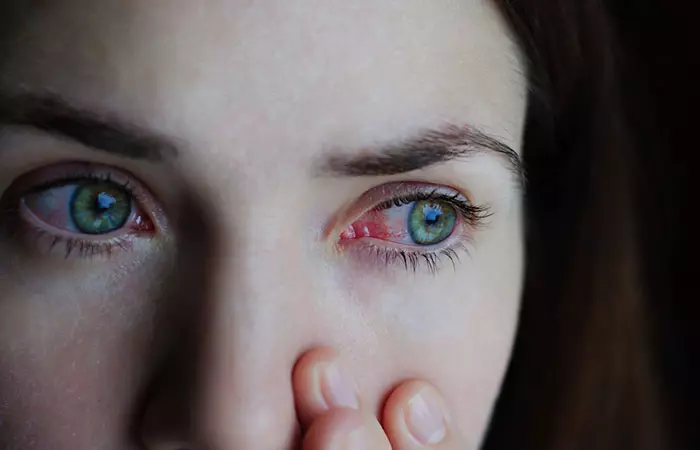
The most obvious symptoms of sore eyes are :
- Dryness of the eyes
- Redness in the eyes
- Irritability of the eyeballs or eyelids
- Pain in the eyeballs
- Watering of the eyes
- Blurred vision
- Eye fatigue or eye strain
Many experience a dry, gritty feeling that makes them want to rub their eyes constantly. However, recognizing these symptoms early can help you act quickly and prevent things from worsening. If you experience any of these symptoms along with red eyes, see a doctor immediately.
Discomfort, burning, eyelids stuck together, difficulty in opening your eyes after waking up, sore lymph glands, sore throat, and a runny nose are some other not-so-obvious symptoms that could be a sign of sore eyes.
The question is, is there a way to find relief from sore eyes? Yes, there is. Not just one, but many easy, natural methods to give your eyes some rest. Keep reading to know more about how to treat sore eyes.
Home Remedies For Sore Eyes
- Cold Compress
- Cucumber
- Aloe Vera Gel
- Castor Oil
- Rose Water
- Apple Cider Vinegar
- Milk And Honey
- Baking Soda
- Potato
- Coriander
- Epsom Salt
- Guava Leaves
- Calamansi
- Turmeric Eyewash
- Salt Water
1. Cold Compress
The coldness of the ice pack will soothe the irritated and sore eye and reduce the burning sensation (1).This simple home remedy for sore eyes is preferred over a warm compress as it aids in calming the inflamed skin. Always ensure that the ice pack you are using is clean to prevent introducing bacteria or irritants to the eye, which can worsen the condition.
You Will Need
An ice pack
What You Have To Do
Place the ice pack on the sore eye for 4-5 minutes.
How Often You Should Do This
Repeat 2-3 times in a day.
- Use a frozen food item wrapped in a clean, soft cloth and place this over the sore eye.
- Dip a washcloth in cold water and place it on the eye.
- Place a metal spoon in the freezer for a couple of minutes and place this cold spoon on the affected eye.
- Place a used tea bag in the refrigerator for a couple of minutes. Place the cold tea bag on the sore eye. You can use a green tea bag, peppermint tea bag, calendula tea bag, black tea bag, chamomile tea bag, or even rooibos tea bags for sore eyes. An added benefit of using a tea bag is that the antioxidants present in it can accelerate the healing process. They also have anti-inflammatory properties that reduce the swelling often seen in sore eyes (2, 3).
2. Cucumber
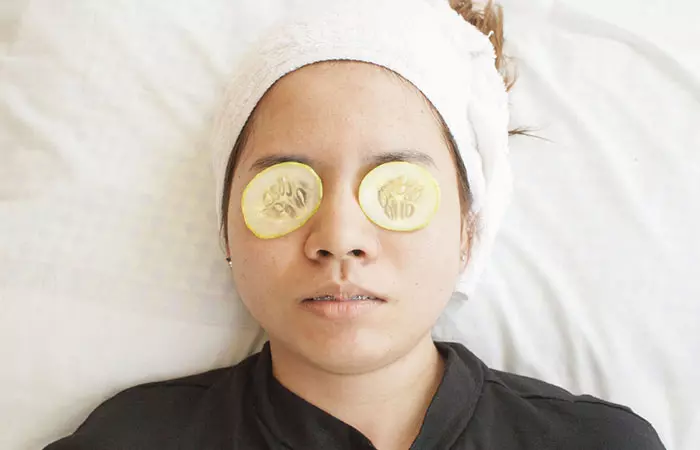
It is a known fact that cucumber has a cooling effect on our body (4). It has the same effect on our eyes as well. It soothes the eyes and heals any soreness or irritation. It can also help lighten dark circles and soothe puffy eyes. However, avoid using this remedy if you are allergic to cucumbers.
You Will Need
- 2 cucumber slices
- Cold water
What You Have To Do
- Soak the slices in cold water for 2-3 minutes.
- Place this on the eyes for 10 minutes.
How Often You Should Do This
Repeat this as and when required to provide relief from the soreness.
3. Aloe Vera Gel
Aloe vera has an extremely relaxing effect on your eyes because of its soothing properties. Eye drops containing aloe vera extracts can help treat inflammation in the eye (5). Aloe vera gel is a simple home remedy for dry eyes that help manage the issue (6). Use only fresh or organic aloe vera gel. Commercial variants may contain additives that can irritate your eyes.
Caution: Use only fresh or organic aloe vera gel. Commercial variants may contain additives that can irritate your eyes.
You Will Need
- 1 teaspoon aloe vera gel
- 1-2 tablespoons cold water
- 2 cotton balls
What You Have To Do
- Dilute fresh aloe gel with cold water.
- Soak the cotton rounds in this and place them on the eyelids for 10 minutes.
How Often You Should Do This
Do this 2 times a day.
4. Castor Oil
Castor oil is a common ingredient that is found in many eye drops. It has a soothing effect on your eyes and can help reduce eye irritation. Studies show that castor oil helps improve tear stability, prevents evaporation of tears, and has a lubricating effect on dry eyes (7). This may help ease the symptoms of sore eyes. Before applying it directly to your eyes, test a small amount on the skin to ensure you are not allergic to it.
You Will Need
- Organic and pure castor oil
- A dropper
What You Have To Do
- Using a clean dropper, administer a drop of castor oil to each eye.
- Leave this overnight.
How Often You Should Do This
Repeat this every night and also once again during the day.
5. Rose Water
Rose water is a well-known home remedy for relieving eye soreness and tiredness. A herbal eye drop preparation containing rose water extracts as one of the ingredients was found to improve ophthalmic disorders like conjunctivitis, dry eye, and cataractsi A condition where the natural lenses of the eyes become cloudy, causing blurry and hazy vision, especially in aged people. (8). Therefore, this can be used as an effective home remedy for red eyes and eye infections. Always use pure rose water, as those available for cosmetic or other uses may contain additives or impurities that may irritate or harm the eyes.
You Will Need
- Rose water
- Cotton
What You Have To Do
- Dip the cotton in the rose water and squeeze out the excess.
- Place this on the closed eyelid and leave it on for 10-15 minutes.
- Use chilled rose water for best results.
How Often You Should Do This
Do this 2-3 times in the day.
6. Apple Cider Vinegar
This remedy can give instant relief from eye soreness caused due to infections. ACV has antibacterial and antimicrobial properties (9). These properties can help fight the infection-causing bacteria and thus help in sore eyes treatment. Remember, apple cider vinegar is highly acidic and can irritate the skin and eyes if not diluted correctly. Even diluted, it is best to avoid it if you are prone to skin sensitivities, as it can be too strong for the delicate skin around the eyes.
You Will Need
- 1 tablespoon apple cider vinegar
- 2 tablespoons water
- Cotton balls
What You Have To Do
- Soak a clean cotton ball in a mixture of vinegar and water.
- Place it on your eyelids for 10 minutes.
How Often You Should Do This
Repeat this 1-2 times a day.
7. Milk And Honey
Honey is known to possess antibacterial qualities and can treat dry eyes (10). The warmth of the milk will soothe the irritation and inflammation. However, always perform a patch test to ensure you are not allergic to them.
You Will Need
- 1 teaspoon warm milk
- 2-3 drops honey
- A dropper
What You Have To Do
- Mix the honey with the milk.
- Pour a drop or two of this mixture into the affected eye with a clean dropper
- Keep your eyes closed for a couple of minutes.
- Rinse the eye with clean water later.
How Often You Should Do This
Do this 2 times a day.
8. Baking Soda
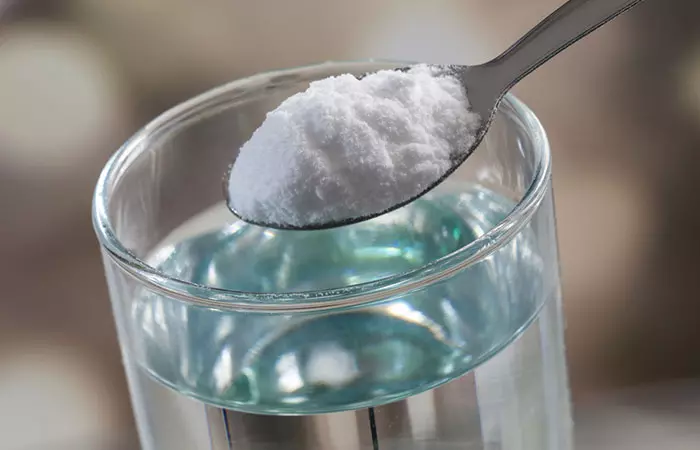
This process helps in cleaning your eyes and flushing out any impurities that may have entered them. Baking soda is also an antiseptic that kills the infection-causing microbes present in and around the affected area (11). Avoid using this remedy if you are prone to skin sensitivities. If you end up using it and experience any eye discomfort or irritation, seek medical advice immediately.
You Will Need
- 1 teaspoon baking soda
- Water
- A cup or a glass
What You Have To Do
- Take a cup or glass that can fit around your eye.
- Add the baking soda to it and fill it with water.
- Hold the eye over this water and try to keep it open for as long as possible. Try and roll your eyes around for a minute or two.
- Rinse out the baking soda water remnants with plain, clean water.
How Often You Should Do This
Repeat this once a day until the infection and soreness are cured.
9. Potato
Potatoes help reduce any sort of eye inflammation (12). You can also use potato peel to rub on the irritated skin, as it possesses anti-inflammatory properties (13). This will reduce the swelling and soothe the skin around the eyes. However, do a patch test before using it around your eyes.
You Will Need
- A potato
- Cotton pad
What You Have To Do
- Peel and grate the potato.
- Squeeze out the juice and pour it over the cotton pad.
- Place the soaked cotton pad on the affected eye for 15 minutes.
How Often You Should Do This
Repeat once every day, preferably at night.
10. Coriander
This is one of the best home remedies for itchy eyes. Coriander is commonly used in Ayurvedic medication for eye infections and soreness (14). A study showed that coriander seeds extract (10-15 drops of coriander spray) could help relieve itchy eyes (15). Coriander leaves can carry dirt, germs, and pesticides. So, wash them thoroughly before use to avoid introducing any harmful substances into your eyes.
You Will Need
- A handful of coriander leaves
- An eye dropper
What You Have To Do
- Grind the coriander leaves to extract the juice out of them.
- Now, take the eye dropper and suck in this liquid. Pour two drops each into both the eyes.
Although you can limit using this solution only for the infected eye, it is advisable that you pour the eye drops in the non-infected eye as well as a precautionary measure.
How Often You Should Do This
Repeat this 2 times a day.
11. Epsom Salt
Epsom salt (magnesium sulfate) has soothing and anti-inflammatory properties (16). This can help relieve inflammation and soothe your eyes. However, avoid this remedy if the skin around your eyes is broken, inflamed, or irritated, as anecdotal evidence suggests Epsom salt may cause stinging or further irritation.
You Will Need
- 1 teaspoon Epsom salt
- 1/2 cup hot water
- Cotton rounds
What You Have To Do
- Add the salt to the hot water and mix thoroughly until it dissolves.
- Once the temperature becomes warm and bearable, soak the cotton round in this and place it over the eye.
- Leave it on for 5-7 minutes. Rinse your eye (and face) with cool water.
- Pat the skin dry and apply a mild moisturizer around the eye to prevent the skin from drying up due to the salt.
How Often You Should Do This
Repeat this 1-2 times a day.
12. Guava Leaves
This remedy can help treat sore eyes caused due to infections. Guava leaves possess antimicrobial, anti-inflammatory, and analgesici The property or drug that helps relieve pain without the need for numbing the nerves or altering sensory perception. properties (17). They help reduce irritation, swelling, and pain around the eye. Avoid using this remedy if you are allergic to guavas. In case of irritation, consult your doctor right away.
You Will Need
- 4-5 guava leaves
- A glass of water
- A soft face cloth
What You Have To Do
- Boil the guava leaves.
- Dampen the face cloth and place the warm guava leaves in between to make a hot compress.
- Place this on the infected eye for 10-12 minutes.
How Often You Should Do This
Repeat every day until the eye infection goes away.
13. Calamansi
Calamansi (or calamondin) is a citrus fruit hybrid that is commonly known as the Philippine lime. Calamansi possesses antimicrobial properties (18). This can help clear the infection in the eye and reduce soreness.
Caution: The juice can sting due to its citric nature. This is completely normal.
You Will Need
- 1-2 drops calamansi juice
- 3-4 drops warm water
What You Have To Do
- Dilute the calamansi juice with water and pour a drop or two into the affected eye.
- Roll the eye a few times and then rinse the juice out with plain water.
How Often You Should Do This
Do this once a day.
14. Turmeric

Turmeric contains curcumin that has anti-inflammatory and antioxidant properties. Studies showed that curcumin had beneficial effects on several eye diseases, like dry eye syndrome, glaucomai A group of eye diseases that causes optic nerve damage and loss of vision due to excess pressure in the eye. , and age-related macular degeneration (19). Before using turmeric anywhere near the eye area, perform a patch test to check for allergic reactions or irritation.
You Will Need
- 1/2 teaspoon turmeric
- 1 glass water
- A dropper
What You Have To Do
- Heat the water until it is warm and then add turmeric powder to it. Mix well.
- Administer a drop of this mixture to the affected eye.
How Often You Should Do This
Use this sore eyes home remedy 2 times a day.
15. Salt Water
Salt water, or a saline solution, has natural disinfectant properties. It has been used traditionally to cleanse the eyes and reduce irritation and eye soreness or redness (20). If you experience any discomfort, burning, or worsening of symptoms after using salt water, stop using it immediately and consult a healthcare professional.
You Will Need
- 1 teaspoon of salt
- 1 cup of warm, distilled water
- A clean, sterile cup
- Clean, sterile cotton ball or pad
What You Have To Do
- Mix the salt in the boiled water and stir until it has dissolved.
- Dip a cotton ball or sterile cotton pad into the saline solution.
- Close your eyes and gently wipe them with the soaked cotton ball.
- Use a different cotton ball or pad for each eye to prevent the spread of infection.
- Rinse your eyes with cool plain water afterwards.
How Often You Should Do This
Do this 2-3 times a day.
Apart from using these sore eyes home remedies, the one thing you need to do to keep your eyes healthy is sleep well. When we sleep, our body gets rejuvenated, and we feel refreshed when we wake up. This also applies to the eyes. They are in constant use the entire time you are awake, and hence, giving them sufficient rest is important. Get 6-8 hours of sound sleep every day.
If the above remedies do not provide relief from sore eyes even after continued use, consult your healthcare provider to test for any serious underlying condition. Here are some alarming symptoms that require immediate medical help.
When To See Your Doctor
Contact your doctor immediately if you experience any of the following:
- Pus coming out of your eyes
- Sudden blurry vision
- Seeing light or illusionary lights
- Difficulty in moving the eyeballs
Scroll down below to know more about how to prevent sore eyes in the first place.
Prevention Methods And Tips For Sore Eyes
Preventive measures for sore eyes are vital to maintaining good eye health and avoiding discomfort. Here are some tips to help keep your eye health in check.
(a) Wearing Sunglasses And Goggles
When you step out of your house and into the sun, always remember to wear UV protection sunglasses. Also, if you happen to be a swimmer, make sure to wear goggles when you enter the pool to prevent the chlorine from affecting your eyes as chlorine tends to make your eyes itch and has also been known to make them red and puffy.
(b) Drink Lots Of Water
Your eyes need to be kept hydrated, and this can be easily done by drinking plenty of water. During the summer months, water helps in not only cooling your body but also energizing it. This also improves your immune system.
(c) Follow A Healthy Diet
Another important factor is a healthy diet. A wholesome, nutritious diet can keep you stress-free and your eyes healthy. Consume foods rich in vitamin A and vitamin C. These support eye health and enhance immunity, respectively.
A few vitamin A-rich foods are eggs, cod liver oil, broccoli, spinach, yellow fruits and vegetables like carrot, papaya, pumpkin, and mango.
Vitamin C-rich foods are citrus fruits like lemon, sweet lime, oranges, grapes, and kiwi and vegetables like broccoli, cauliflower, Brussels sprouts, and capsicum.
(d) Do Eye Exercises
Do simple eye exercises every day to keep the muscles in and around your eyes strong. Exercising them also relieves strain.
 Quick Tip
Quick Tip(e) Don’t Give In To Stress
A large number of eye-related illnesses are caused due to mental stress. Lack of proper rest and sleep are the major factors behind the increased levels of stress. That is why you must give your body and mind a break. Sleep for at least 8 hours every day to keep stress at bay. Practicing yoga and meditation also helps.
(f) Relieve Physical Stress
We use our eyes every millisecond we are awake. While looking at normal surroundings is alright, when you continuously stare at a screen, like computers or TV screens, your eyes experience physical stress.
Give your eyes a break by looking elsewhere at a far-off point for a few minutes, now and then. If there is a tree or a shrub around, you could look at it too. The color green is said to soothe the eyes.
(g) Maintain proper eye care
It is extremely important to take proper care of the eyes and maintain hygiene. Ensure you change the pillow cases every third day and remove eye makeup thoroughly before sleeping.
 Quick Tip
Quick TipIf you don’t find relief from sore eyes after using the above-mentioned home remedies, consult your healthcare provider immediately. Try out any one of them or a combination of them to relieve the symptoms of sore eyes. Some other recommendations or eye care tips can also be tried, such as vitamin E oil, coconut oil, lavender oil, eucalyptus oil, potato slices, and witch hazel drops. Anecdotal evidence suggests the usage of fennel seeds and fenugreek seeds in soothing sore eye and supporting eye health.
Contact emergency medical help if you experience severe pain associated with foreign body lodgement, chemical injury, and burn injury. Some symptoms need immediate attention, like severe pain, photophobiai A condition characterized by sensitivity to light, where one's eyes experience discomfort in bright light. , headaches, halos around light, high fever, and sudden vision changes.
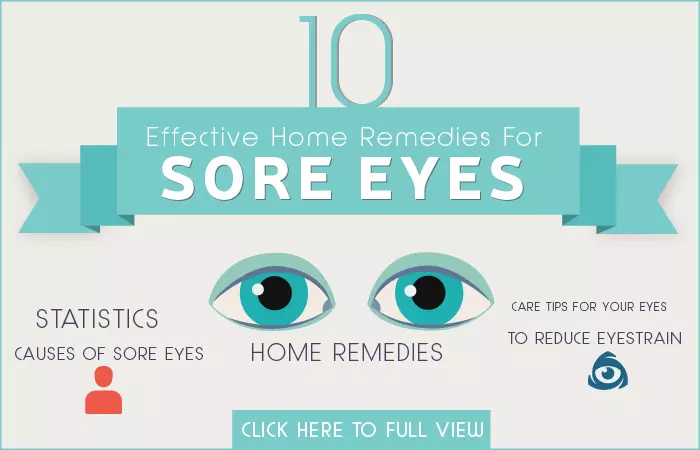
Tired of dealing with sore eyes? Discover 10 effective, simple, and natural ways to relieve them by watching this informative video.
Infographic: 6 Home Remedies To Treat Sore Eyes
Your eyes can be sore due to various reasons, such as infections or allergies. Antibiotic drops and ointments are easily available, but if you prefer natural remedies, we have handpicked the ones readily available on short notice. Check out the infographic below to find out more!
Some thing wrong with infographic shortcode. please verify shortcode syntax
Sore eyes may stem from multiple causes like sun exposure, contact lenses, infections, eye rubbing, dryness, excess screen exposure, and viral infections. Redness, irritability, blurry vision, and watering are common symptoms that may accompany sore eyes. Applying home remedies for sore eyes like cucumber, cold compress, guava leaves, potato, milk and honey, apple cider vinegar, etc., may provide relief quickly. However, you need to contact your healthcare provider immediately if you notice any serious symptoms like pus formation, difficulty moving the eyeballs, difficulty seeing, or illusionary lights in your sight.
Frequently Asked Questions
How long do sore eyes last?
Sore eyes last for a couple of days after the initial symptoms appear, depending on the cause. The time taken for healing sore eyes also depends on the intensity of the infection.
Conjunctivitis could be bacterial, chlamydiali An infection caused by the bacterium Chlamydia trachomatis that is related to or leads to STD or other infections. , or viral, depending on which the period of healing is defined. Patients who are old or have low immunity, diabetes, and malnutrition could take up to 20–25 days to recover.
If proper medical care is taken and hygiene is maintained, sore eyes could heal much faster than the stipulated time.
Is a sore eye contagious?
Yes, sore eyes are contagious when the condition is caused due to an eye infection.
How can sore eyes be transmitted?
Sore eyes can be a result of an infection, such as conjunctivitis, that could be chlamydial, bacterial, or viral, which leads to either unilateral or bilateral red eye infection.
Sharing the same utensils, towels, and clothes and shaking hands with the infected person can make you contract the infection.
Also, having health issues like malnutrition or low immunity increases the chances of contracting the infection. The transmission also depends on the kind of infection one has.
Is a sore eye a sign of pregnancy?
Though a sore eye is not essentially a sign of pregnancy, many women experience dryness of eyes, vision problems, and irritable eyes all through pregnancy, which could result in sore eyes.
What is the fastest way to treat sore eyes?
Follow your healthcare provider’s advice by taking your medications on time. Avoid rubbing your eyes or staring at digital screens for more than 20 minutes straight. Giving enough rest to your eyes also helps.
What can I wash my sore eyes with?
You may use salt water to rinse your eyes or flush them with cool water. You can also place a cold cloth over them for a while.
The cause of this is associated with the hormonal changes that occur in a woman’s body during pregnancy.
References
Articles on StyleCraze are backed by verified information from peer-reviewed and academic research papers, reputed organizations, research institutions, and medical associations to ensure accuracy and relevance. Read our editorial policy to learn more.
- Ice Compresses Aid the Reduction of Swelling and Pain After Scleral Buckling Surgery, Journal of Clinical Nursing, US National Library of Medicine, National Institutes of Health.
https://pubmed.ncbi.nlm.nih.gov/27550824// - Green tea: A boon for periodontal and general health. Journal of Indian Society of Periodontology, US National Library of Medicine, National Institutes of Health.
https://www.ncbi.nlm.nih.gov/pmc/articles/PMC3459493/ - Chamomile: A herbal medicine of the past with bright future. Molecular Medicine Reports, US National Library of Medicine, National Institutes of Health.
https://www.ncbi.nlm.nih.gov/pmc/articles/PMC2995283/ - Phytochemical and therapeutic potential of cucumber. Fitoterapia, US National Library of Medicine, National Institutes of Health.
https://pubmed.ncbi.nlm.nih.gov/23098877/ - Aloe vera extract activity on human corneal cells. Pharmaceutical Biology, US National Library of Medicine, National Institutes of Health.
https://pubmed.ncbi.nlm.nih.gov/22338121// - To evaluate the efficacy of Gritakumari (Aloe Vera Gel) in the management of Shushkakshipaka (Dry Eye Syndrome), International Journal of Pharmaceutical and Medicinal Research, Semantic Scholar.
https://www.semanticscholar.org/paper/To-evaluate-the-efficacy-of-Gritakumari-%28-Aloe-Vera-Kanaujia/6059455a045128b458cf2b1f573ed7d3f7bba0ca?p2df - Low-concentration Homogenized Castor Oil Eye Drops for Noninflamed Obstructive Meibomian Gland Dysfunction, Ophthalmology, US National Library of Medicine, National Institutes of Health.
https://pubmed.ncbi.nlm.nih.gov/12414410/ - Evaluation of Ophthacare Eye Drops–A Herbal Formulation in the Management of Various Ophthalmic Disorders, Phytotherapy Research, US National Library of Medicine, National Institutes of Health.
https://pubmed.ncbi.nlm.nih.gov/11746845// - Antimicrobial activity of apple cider vinegar against Escherichia coli, Staphylococcus aureus and Candida albicans; downregulating cytokine and microbial protein expression, Scientific Reports, US National Library of Medicine, National Institutes of Health.
https://www.ncbi.nlm.nih.gov/pmc/articles/PMC5788933/ - Honey: A Natural Remedy for Eye Diseases, Forschende Komplementarmedizin, US National Library of Medicine, National Institutes of Health.
https://pubmed.ncbi.nlm.nih.gov/27924791// - Antibacterial Activity of Baking Soda, Compendium of Continuing Education in Dentistry, US National Library of Medicine, National Institutes of Health.
https://pubmed.ncbi.nlm.nih.gov/12017929/ - Health Benefits and Cons of Solanum tuberosum, Journal of Medicinal Plants Studies, Phytojournal.
https://www.plantsjournal.com/vol1Issue1/Issue_jan_2013/3.pdf - Anti-inflammatory Properties of Potato Glycoalkaloids in Stimulated Jurkat and Raw 264.7 Mouse Macrophages, Life Sciences, US National Library of Medicine, National Institutes of Health.
https://pubmed.ncbi.nlm.nih.gov/23454444/ - Coriander (Coriandrum sativum L.): A Potential Source of High-Value Components for Functional Foods and Nutraceuticals – A Review, Phytotherapy Research, ResearchGate.
https://www.researchgate.net/publication/234029175_Coriander_Coriandrum_sativum_L_A_Potential_Source_of_High-Value_Components_for_Functional_Foods_and_Nutraceuticals_-_A_Review - Effect of Coriandrum sativum seed extract on the signs of allergic rhinitis, Semantic Scholar.
https://www.semanticscholar.org/paper/Effect-of-Coriandrum-sativum-seed-extract-on-the-of-Amani-Geshnigani-Shabanian/55dbeb6b4b968f1050989fd024e29773f47fd679?p2df - The use of Epsom salts, historically considered, Canadian Medical Association Journal, US National Library of Medicine, National Institutes of Health.
https://www.ncbi.nlm.nih.gov/pmc/articles/PMC1584988/pdf/canmedaj00347-0031.pdf - Phytochemical investigation and antimicrobial activity of Psidium guajava L. leaves, Pharmacognosy Magazine, US National Library of Medicine, National Institutes of Health.
https://www.ncbi.nlm.nih.gov/pmc/articles/PMC2950385/ - Phenolic Compounds and Biological Activities of Small-Size Citrus: Kumquat and Calamondin, Journal of Food and Drug Analysis, US National Library of Medicine, National Institutes of Health.
https://pubmed.ncbi.nlm.nih.gov/28911534// - Curcumin: Therapeutical Potential in Ophthalmology, Planta Medica, US National Library of Medicine, National Institutes of Health.
https://pubmed.ncbi.nlm.nih.gov/24323538// - The red eye – first aid at the primary level
https://www.ncbi.nlm.nih.gov/pmc/articles/PMC1705661/
Read full bio of Dr. Bhakti Kapse
Read full bio of Shaheen Naser
Read full bio of Arshiya Syeda
Read full bio of Dipti Sharma







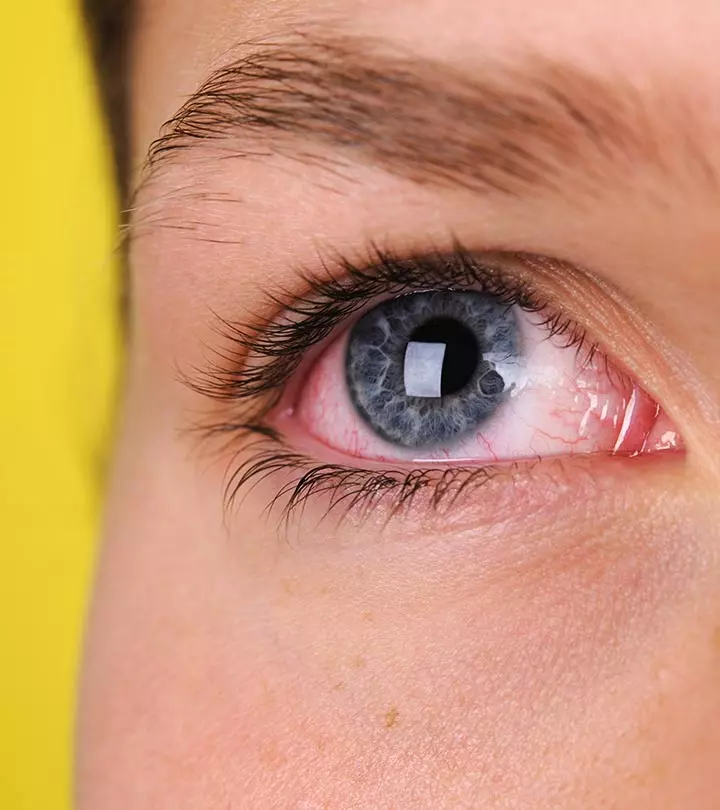














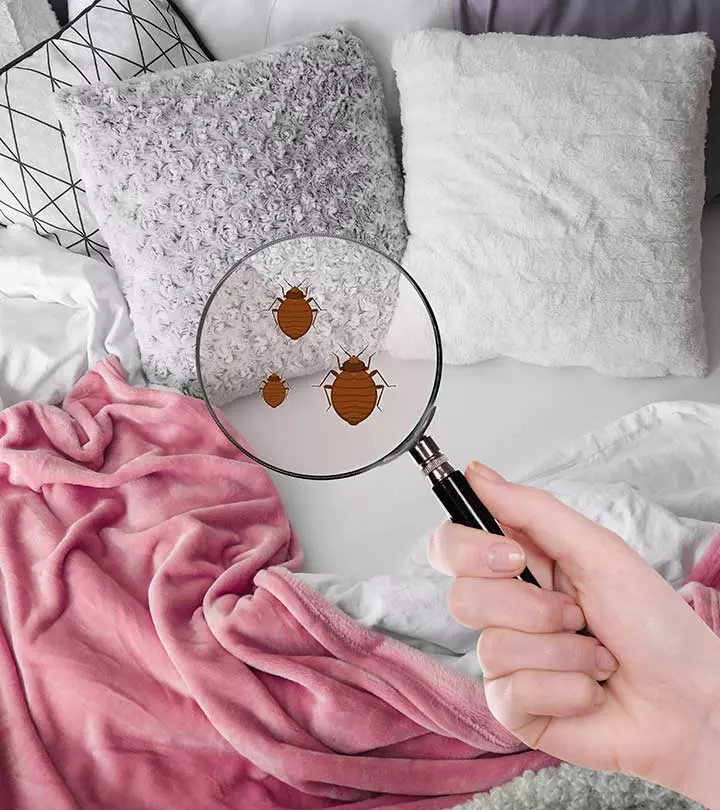



Community Experiences
Join the conversation and become a part of our empowering community! Share your stories, experiences, and insights to connect with other beauty, lifestyle, and health enthusiasts.